| Listing 1 - 10 of 19 | << page >> |
Sort by
|
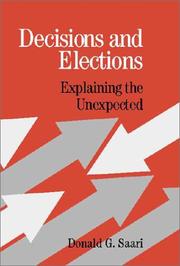
ISBN: 0521004047 0521808162 0511606079 0511891652 9780521004046 9780511606076 9780521808163 Year: 2001 Publisher: Cambridge Cambridge University Press
Abstract | Keywords | Export | Availability | Bookmark
 Loading...
Loading...Choose an application
- Reference Manager
- EndNote
- RefWorks (Direct export to RefWorks)
It is not uncommon to be frustrated by the outcome of an election or a decision in voting, law, economics, engineering, and other fields. Does this 'bad' result reflect poor data or poorly informed voters? Or does the disturbing conclusion reflect the choice of the decision/election procedure? Nobel Laureate Kenneth Arrow's famed theorem has been interpreted to mean 'no decision procedure is without flaws'. Similarly, Nobel Laureate Amartya Sen dashes hope for individual liberties by showing their incompatibility with societal needs. This highly accessible book offers a new, different interpretation and resolution of Arrow's and Sen's theorems. Using simple mathematics, it shows that these negative conclusions arise because, in each case, some of their assumptions negate other crucial assumptions. Once this is understood, not only do the conclusions become expected, but a wide class of other phenomena can also be anticipated.
Social choice. --- Decision making. --- Elections. --- Decision Making. --- Decision making --- Business, Economy and Management --- Economics --- Mathematical models. --- Deciding --- Decision (Psychology) --- Decision analysis --- Decision processes --- Making decisions --- Management --- Management decisions --- Choice (Psychology) --- Problem solving
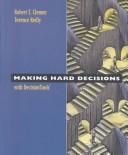
ISBN: 0534365973 Year: 2001 Publisher: USA Duxbury/Thomson Learning
Abstract | Keywords | Export | Availability | Bookmark
 Loading...
Loading...Choose an application
- Reference Manager
- EndNote
- RefWorks (Direct export to RefWorks)
Décision, Prise de --- Decision making. --- Decision making --- Prise de décision --- Logiciels --- Computer programs --- DecisionTools. --- Deciding --- Decision (Psychology) --- Decision analysis --- Decision processes --- Making decisions --- Management --- Management decisions --- Choice (Psychology) --- Problem solving --- Decision tools
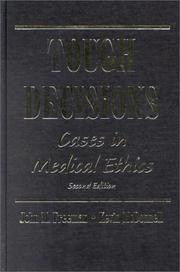
ISBN: 0199759669 1280760516 9786610760510 9780199759668 0195090411 9780195090413 019509042X 9780195090420 9781280760518 6610760519 0197709109 0190282371 Year: 2001 Publisher: Oxford ; New York : Oxford University Press,
Abstract | Keywords | Export | Availability | Bookmark
 Loading...
Loading...Choose an application
- Reference Manager
- EndNote
- RefWorks (Direct export to RefWorks)
Tough Decisions places readers in realistic composites of cases the authors have actually seen or managed where they must make tough medical decisions.
Medical ethics --- Clinical medicine --- Decision making --- Deciding --- Decision (Psychology) --- Decision analysis --- Decision processes --- Making decisions --- Management --- Management decisions --- Choice (Psychology) --- Problem solving --- Medicine, Clinical --- Medicine --- Moral and ethical aspects --- Clinical Medicine. --- Decision Making. --- Ethics, Medical. --- Moral and ethical aspects.

ISBN: 9780511498602 9780521800099 9780521038034 0511018924 9780511018923 0521800099 0511498608 1107122368 0521038030 1280430184 051104738X 9786610430185 0511175221 0511155425 0511302509 Year: 2001 Publisher: Cambridge, UK New York Cambridge University Press
Abstract | Keywords | Export | Availability | Bookmark
 Loading...
Loading...Choose an application
- Reference Manager
- EndNote
- RefWorks (Direct export to RefWorks)
In Decision Space: Multidimensional Utility Analysis, first published in 2001, Paul Weirich increases the power and versatility of utility analysis and in the process advances decision theory. Combining traditional and novel methods of option evaluation into one systematic method of analysis, multidimensional utility analysis is a valuable tool. It provides formulations of important decision principles, such as the principle to maximize expected utility; enriches decision theory in solving recalcitrant decision problems; and provides in particular for the cases in which an expert must make a decision for a group of people. The multiple dimensions of this analysis create a decision space broad enough to accommodate all factors affecting an option's utility. The book will be of interest to advanced students and professionals working in the subject of decision theory, as well as to economists and other social scientists.
Decision making. --- Utility analysis. --- Deciding --- Decision (Psychology) --- Decision analysis --- Decision processes --- Making decisions --- Management --- Management decisions --- Choice (Psychology) --- Problem solving --- Decision making --- Utility theory. --- Demand (Economic theory) --- Value --- Revealed preference theory --- Arts and Humanities --- Philosophy
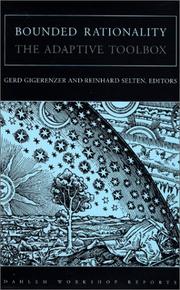
ISBN: 0262072149 0262571641 0585388288 0262273810 0585477574 9780585388281 9780262072144 9780262273817 9780585477572 9780262571647 Year: 2001 Publisher: Cambridge, Mass. London MIT Press
Abstract | Keywords | Export | Availability | Bookmark
 Loading...
Loading...Choose an application
- Reference Manager
- EndNote
- RefWorks (Direct export to RefWorks)
In a complex and uncertain world, humans and animals make decisions under the constraints of limited knowledge, resources, and time. Yet models of rational decision making in economics, cognitive science, biology, and other fields largely ignore these real constraints and instead assume agents with perfect information and unlimited time. About forty years ago, Herbert Simon challenged this view with his notion of "bounded rationality." Today, bounded rationality has become a fashionable term used for disparate views of reasoning.This book promotes bounded rationality as the key to understanding how real people make decisions. Using the concept of an "adaptive toolbox," a repertoire of fast and frugal rules for decision making under uncertainty, it attempts to impose more order and coherence on the idea of bounded rationality. The contributors view bounded rationality neither as optimization under constraints nor as the study of people's reasoning fallacies. The strategies in the adaptive toolbox dispense with optimization and, for the most part, with calculations of probabilities and utilities. The book extends the concept of bounded rationality from cognitive tools to emotions; it analyzes social norms, imitation, and other cultural tools as rational strategies; and it shows how smart heuristics can exploit the structure of environments.
Decision making --- Reasoning --- Argumentation --- Ratiocination --- Reason --- Thought and thinking --- Judgment (Logic) --- Logic --- Deciding --- Decision (Psychology) --- Decision analysis --- Decision processes --- Making decisions --- Management --- Management decisions --- Choice (Psychology) --- Problem solving --- -Reasoning --- -153.43 --- Conferences - Meetings --- bedrijven, management --- besluitvorming --- 65.012.4 --- Business management, administration. Commercial organization --- Social Sciences --- Psychology --- COGNITIVE SCIENCES/Psychology/Cognitive Psychology --- COGNITIVE SCIENCES/General --- Decision making - Congresses. --- Reasoning - Congresses.
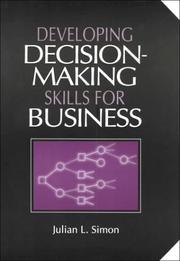
ISBN: 0765606763 1315499819 9786610912131 1280912138 0765613956 1315499800 9780765613950 9780765606761 9781315499819 9781315499789 9781315499796 1315499797 Year: 2001 Publisher: Armonk, N.Y. M.E. Sharpe
Abstract | Keywords | Export | Availability | Bookmark
 Loading...
Loading...Choose an application
- Reference Manager
- EndNote
- RefWorks (Direct export to RefWorks)
This volume teaches readers how to improve their professional decision-making skills and enhance their ability to develop long-lasting interpersonal relationships with co-workers or clients. It covers a range of topics, including identifying taste and preferences, HRM, and risk and uncertainty.
Corporate culture. --- Decision making. --- Psychology, Industrial. --- Business psychology --- Industrial psychology --- Psychotechnics --- Culture, Corporate --- Institutional culture --- Organizational culture --- Deciding --- Decision (Psychology) --- Decision analysis --- Decision processes --- Making decisions --- Management --- Management decisions --- Decision making --- Industrial engineering --- Personnel management --- Psychology, Applied --- Industrial psychologists --- Corporations --- Organizational behavior --- Business anthropology --- Choice (Psychology) --- Problem solving --- Sociological aspects
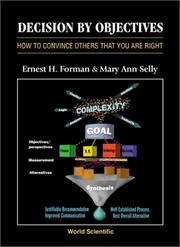
ISBN: 9810241437 9810241429 9786611956349 1281956341 9812810692 9789812810694 9781281956347 9789810241438 9789810241421 6611956344 Year: 2001 Publisher: River Edge, N.J. World Scientific
Abstract | Keywords | Export | Availability | Bookmark
 Loading...
Loading...Choose an application
- Reference Manager
- EndNote
- RefWorks (Direct export to RefWorks)
Decision-making is a process of choosing from possible courses of action in order to attain goals and objectives. Nobel laureate Herbert Simon wrote that the whole process of managerial decision-making is synonymous with the practice of management. Decision-making is at the core of all managerial functions. Planning, for example, involves the following decisions: What should be done? When? How? Where? By whom? Other managerial functions, such as organizing, implementing, and controlling, rely heavily on decision-making. Decision by Objectives is an invaluable book about the art and sc
Decision making --- Management by objectives --- 658.012.4.011.1 --- Management --- Deciding --- Decision (Psychology) --- Decision analysis --- Decision processes --- Making decisions --- Management decisions --- Choice (Psychology) --- Problem solving --- Management by objectives. --- Decision making. --- #SBIB:021.IO --- #SBIB:316.334.2A551 --- #SBIB:35H302 --- #SBIB:35H412 --- Partijen en strategieën in de onderneming: ondernemingsbeleid en management --- Organisatieleer: processen --- Beleidscyclus: vaststelling, besluitvorming
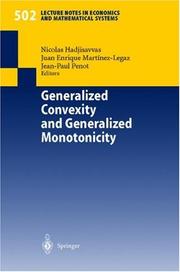
ISBN: 3642566456 3540418067 Year: 2001 Volume: 502 Publisher: Berlin ; Heidelberg ; New York : Springer,
Abstract | Keywords | Export | Availability | Bookmark
 Loading...
Loading...Choose an application
- Reference Manager
- EndNote
- RefWorks (Direct export to RefWorks)
Convex functions --- Monotonic functions --- Geometry --- Operational research. Game theory --- Mathematical optimization. --- Operations research. --- Decision making. --- Calculus of variations. --- Optimization. --- Operations Research/Decision Theory. --- Calculus of Variations and Optimal Control; Optimization. --- Isoperimetrical problems --- Variations, Calculus of --- Maxima and minima --- Deciding --- Decision (Psychology) --- Decision analysis --- Decision processes --- Making decisions --- Management --- Management decisions --- Choice (Psychology) --- Problem solving --- Operational analysis --- Operational research --- Industrial engineering --- Management science --- Research --- System theory --- Optimization (Mathematics) --- Optimization techniques --- Optimization theory --- Systems optimization --- Mathematical analysis --- Operations research --- Simulation methods --- System analysis --- Decision making
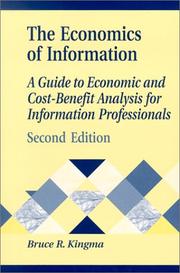
ISBN: 1563088169 Year: 2001 Publisher: Littleton Libraries unlimited
Abstract | Keywords | Export | Availability | Bookmark
 Loading...
Loading...Choose an application
- Reference Manager
- EndNote
- RefWorks (Direct export to RefWorks)
Service industry --- Documentation and information --- 025.11 --- Cost effectiveness --- Economics --- Information science --- -Decision making --- Deciding --- Decision (Psychology) --- Decision analysis --- Decision processes --- Making decisions --- Management --- Management decisions --- Choice (Psychology) --- Problem solving --- Communication --- Information literacy --- Library science --- Benefit cost analysis --- Capital output ratios --- Cost benefit analysis --- Costs, Industrial --- Engineering economy --- Value analysis (Cost control) --- Economic theory --- Political economy --- Social sciences --- Economic man --- Bibliotheekbeheer: financies, budgettering, kostencalculatie --- Economic aspects --- Decision making --- Cost effectiveness. --- Economic aspects. --- 025.11 Bibliotheekbeheer: financies, budgettering, kostencalculatie
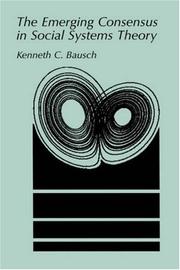
ISBN: 0306465396 1461354684 1461512638 Year: 2001 Publisher: New York (N.Y.): Kluwer Academic/Plenum
Abstract | Keywords | Export | Availability | Bookmark
 Loading...
Loading...Choose an application
- Reference Manager
- EndNote
- RefWorks (Direct export to RefWorks)
In The Emerging Consensus of Social Systems Theory Bausch summarizes the works of over 30 major systemic theorists. He then goes on to show the converging areas of consensus among these out-standing thinkers. Bausch categorizes the social aspects of current systemic thinking as falling into five broadly thematic areas: designing social systems, the structure of the social world, communication, cognition and epistemology. These five areas are foundational for a theoretic and practical systemic synthesis. They were topics of contention in a historic debate between Habermas and Luhmann in the early 1970's. They continue to be contentious topics within the study of social philosophy. Since the 1970's, systemic thinking has taken great strides in the areas of mathematics, physics, biology, psychology, and sociology. This book presents a spectrum of those theoretical advances. It synthesizes what various strains of contemporary systems science have to say about social processes and assesses the quality of the resulting integrated explanations. Bausch gives a detailed study of the works of many present-day systems theorists, both in general terms, and with regard to social processes. He then creates and validates integrated representations of their thoughts with respect to his own thematic classifications. He provides a background of systemic thinking from an historical context, as well as detailed studies of developments in sociological, cognitive and evolutionary theory. This book presents a coherent, dynamic model of a self-organizing world. It proposes a creative and ethical method of decision-making and design. It makes explicit the relations between structure and process in the realms of knowledge and being. The new methodology that evolves in this book allows us to deal with enormous complexity, and to relate ideas so as to draw out previously unsuspected conclusions and syntheses. Therein lies the elegance and utility of this model.
#SBIB:316.21H10 --- #SBIB:022.TOND --- Het functionalisme en systeemdenken in de theoretische sociologie --- Social systems --- System theory. --- Philosophy. --- System theory --- Systems, Theory of --- Systems science --- Philosophy --- Science --- Sociology --- Social sciences. --- Philosophy and social sciences. --- Operations research. --- Decision making. --- Social Sciences, general. --- Methodology of the Social Sciences. --- Philosophy of the Social Sciences. --- Systems Theory, Control. --- Operations Research/Decision Theory. --- Deciding --- Decision (Psychology) --- Decision analysis --- Decision processes --- Making decisions --- Management --- Management decisions --- Choice (Psychology) --- Problem solving --- Operational analysis --- Operational research --- Industrial engineering --- Management science --- Research --- Social sciences and philosophy --- Social sciences --- Behavioral sciences --- Human sciences --- Sciences, Social --- Social science --- Social studies --- Civilization --- Decision making
| Listing 1 - 10 of 19 | << page >> |
Sort by
|

 Search
Search Feedback
Feedback About UniCat
About UniCat  Help
Help News
News